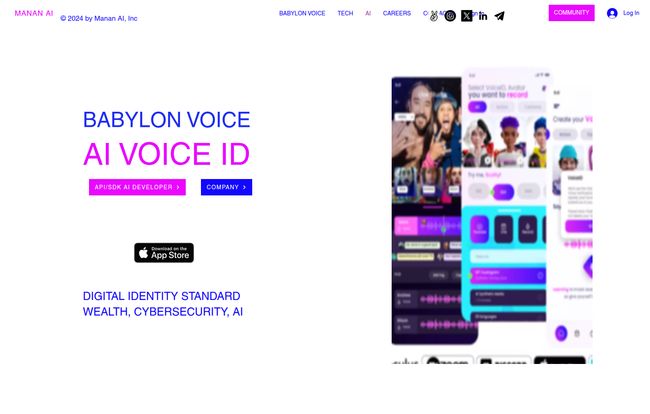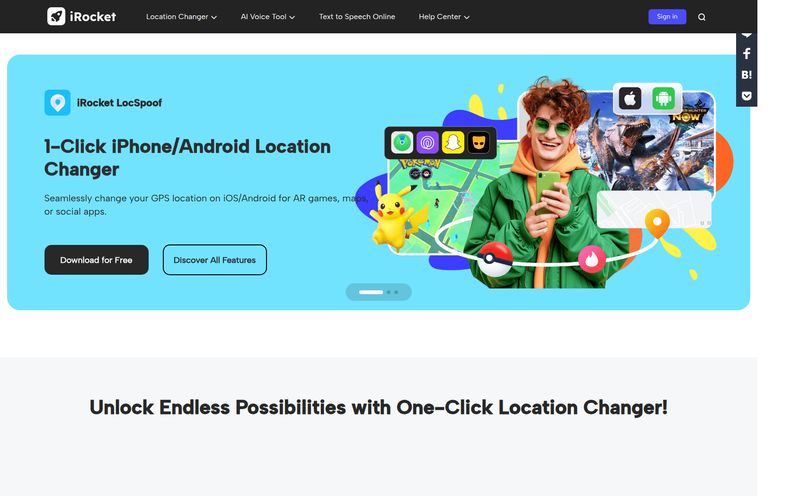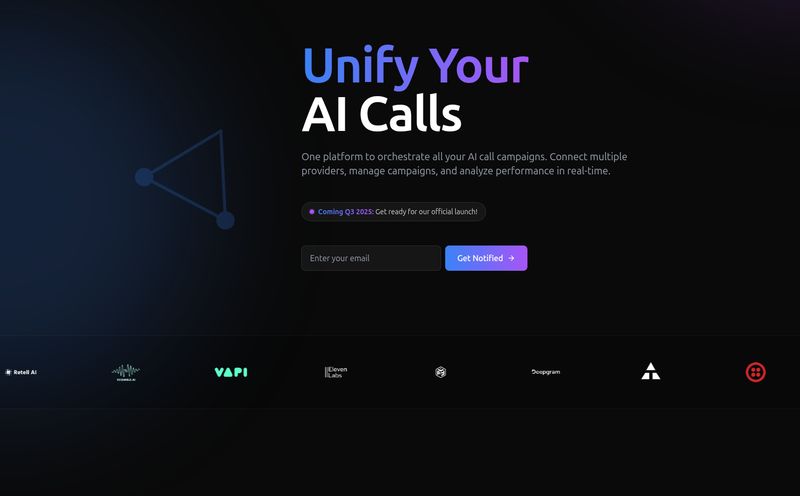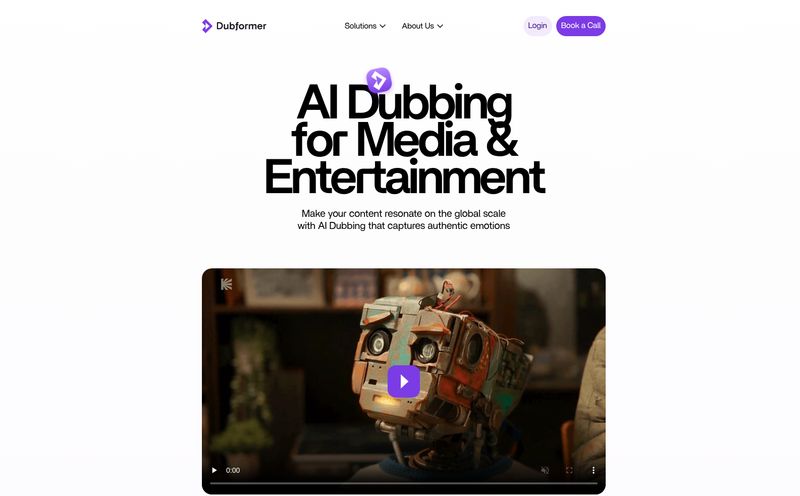Every now and then, a tool pops up on my radar that isn't just another re-skin of something we've seen a hundred times. It’s got that little spark of… something different. It makes you lean in a bit closer to your screen. For me, this week, that tool is Babylon Voice. The website is slick, all purples and dark mode aesthetics, screaming “I am the future.” But as we all know in the SEO and tech world, a pretty face doesn't guarantee a great personality.
We’re swimming in a sea of AI tools right now. AI for writing, AI for images, AI to schedule your dog's vet appointments. So when another “AI Voice” platform comes along, my first reaction is usually a mild, unimpressed shrug. But Babylon Voice isn't just about text-to-speech. It’s talking about AI Voice ID, digital identity, cybersecurity, and the metaverse. Now that gets my attention.

Visit Babylon Voice
So, What Exactly Is Babylon Voice?
Let's get this out of the way: this isn’t just your standard-issue robot voice generator. Think of it less as a simple text-to-speech tool and more like a platform for creating and managing your vocal identity online. The whole pitch is built around this idea of an “AI Voice GPT” designed for a world that’s increasingly digital and decentralized—we're talking games, crypto wallets, and the ever-elusive metaverse.
The core idea seems to be that your voice can be more than just, well, your voice. It can be a key. A fingerprint. A unique, verifiable asset that you own and control. In a world of deepfakes and digital impersonation, the concept of a secure, authenticated voice is honestly pretty compelling. It’s like they’re trying to build a digital passport for your larynx, and I'm here for it.
The Standout Features That Made Me Look Twice
Peeling back the layers of slick marketing, I found a few features that genuinely stand out from the crowd. It’s not a laundry list of a hundred mediocre functions; it’s a tight, focused set of capabilities that all point in the same direction.
Voice Cloning and Your Digital Twin
This is the big one, isn't it? The ability to clone your own voice. We've seen this tech creep into the mainstream, but Babylon Voice frames it around ownership. One of the testimonials on their site mentions “owning our own voice and copyright,” and that’s a powerful statement. For content creators, this is huge. Imagine being able to generate audio for videos, podcasts, or tutorials in your own voice without having to record every single line. It's a massive time-saver. But it also opens up a philosophical can of worms about what it means to “be” present in your content. If the AI sounds just like you, is it still you? Deep thoughts for a Tuesday afternoon.
AI Voice ID as Your New Password
Here’s where my inner security nerd gets excited. The platform heavily promotes “AI Voice ID” and “Voice Authentication.” The idea of using the unique characteristics of your voice as a security measure for logging into wallets or secure platforms is… cool. Really cool. We have fingerprint scanners and Face ID, so Voice ID feels like the next logical step, especially in hands-free environments like VR or AR. It moves voice biometrics from a high-tech sci-fi trope into something potentially accessible. It’s a bold claim, and I'd love to see the security specs behind it, but the ambition is undeniable.
A Nod to Accessibility and Global Reach
This was an unexpected and frankly, wonderful discovery. The platform specifically mentions being designed for users with dyslexia and ADHD. This is more than just a feature; it’s a design philosophy. For someone with dyslexia, having complex text or news summarized and read aloud in a clear, natural voice can be a game-changer. For those with ADHD, audio summaries can make information consumption way more manageable. It’s a thoughtful inclusion that shows they're thinking about real human needs, not just futuristic tech applications. They also support multiple languages right out of the gate—English, French, Spanish and Portuguese. It’s a smart move that shows global ambition from day one.
Wait, I Can Own a Piece of the Cloud?
Okay, this one's a bit 'inside baseball' for the Web3 crowd, but it’s worth mentioning. Babylon Voice talks about “GPU/Cloud ownership.” My interpretation of this is that they might be offering a model where users can own a piece of the infrastructure that runs the AI, possibly through a token or an NFT. It’s a very decentralized, community-owned ethos. While it might be a bit confusing for the average user, it's a clear signal to the crypto and metaverse communities that Babylon Voice “gets it.” It’s a bit vague, sure, but it’s an intriguing hook for a very specific, and very engaged, audience.
Who Is This Actually For?
After poking around, I think Babylon Voice is casting a wide but specific net. First and foremost, gamers and metaverse builders. The potential to create unique NPC voices, or for players to have a consistent, authenticated voice across different platforms, is massive. Then there are the content creators who could streamline their workflow with voice cloning in a huge way.
But then you have the cybersecurity-conscious and the Web3 enthusiasts, drawn in by the promise of voice authentication for wallets and dApps. And, of course, the people who benefit from the accessibility features. It's a diverse group, but the common thread is a belief in a more integrated, and more personal, digital future. It's not for your grandma who just wants to check her email... yet.
The Elephant in the Room: Concrete Use Cases and Pricing
So, here’s my moment of real talk. For all its grand vision, the website is a little... abstract. It’s heavy on the “what” and the “why,” but a bit light on the “how.” I’m left wanting to see more concrete use-case demonstrations. How exactly does the wallet authentication work? What's the process for cloning your voice? How good is the “beautifying” feature, and what does that even mean? Is it just an EQ and compressor, or something more advanced?
And then there’s the price. Or, the lack thereof. There's no pricing page I could find, which is pretty typical for a platform in an early or beta stage. It could be a custom enterprise solution, a future token-based system, or they just havent decided yet. This lack of transparency can be frustrating, but it also creates a sense of exclusivity. For now, it seems you have to get in touch with them directly, which positions them as more of a high-touch, B2B-style service.
FAQs About Babylon Voice
I've seen a few questions pop up, so let's tackle them head-on.
What is Babylon Voice in simple terms?
Think of it as an advanced AI voice platform. It does more than just read text aloud; it lets you clone your voice, create a unique “Voice ID” for security, and is built with applications for gaming, the metaverse, and accessibility in mind.
Can I actually clone my own voice with it?
Yes, voice cloning is one of its main advertised features. The focus seems to be on creating a high-quality, authentic digital replica of your own voice that you can then use for various applications.
Is Babylon Voice free to use?
As of right now, there is no public pricing information available on their website. This suggests it might be in a beta phase, or that they're focusing on enterprise clients or custom partnerships. You'll likely need to contact their team for cost details.
What languages does Babylon Voice support?
Currently, the platform supports English, French, Spanish, and Portuguese, which is a solid starting point for a global user base.
How does it help people with dyslexia or ADHD?
It offers features like a “2 Min AI-Summary” tool. This can condense long articles or files into short, digestible audio clips, which can be a massive help for anyone who finds reading large blocks of text challenging.
My Final Thoughts on Babylon Voice
So, what’s the verdict? I’m cautiously optimistic. I’ve been in this game long enough to see countless platforms promise to revolutionize the world and then quietly fade away. But Babylon Voice has a few things going for it that feel different. The sharp focus on identity and ownership in a Web3 context is smart. The genuine inclusion of accessibility features is commendable. And the technology itself, if it works as well as promised, is undeniably powerful.
It's a project with massive ambition. It’s trying to solve future problems, today. Will it succeed? The jury's still out. It needs to be more transparent with its functionality and eventually, its pricing. But am I going to be keeping a very close eye on it? You bet I am. In the noisy world of AI, Babylon Voice is a signal worth paying attention to.
References and Sources
- Babylon Voice official website (Note: As of this writing, some pages or details were still under development).
- WIRED - What Is Web3? - For context on the decentralized internet concepts that Babylon Voice is built upon.



